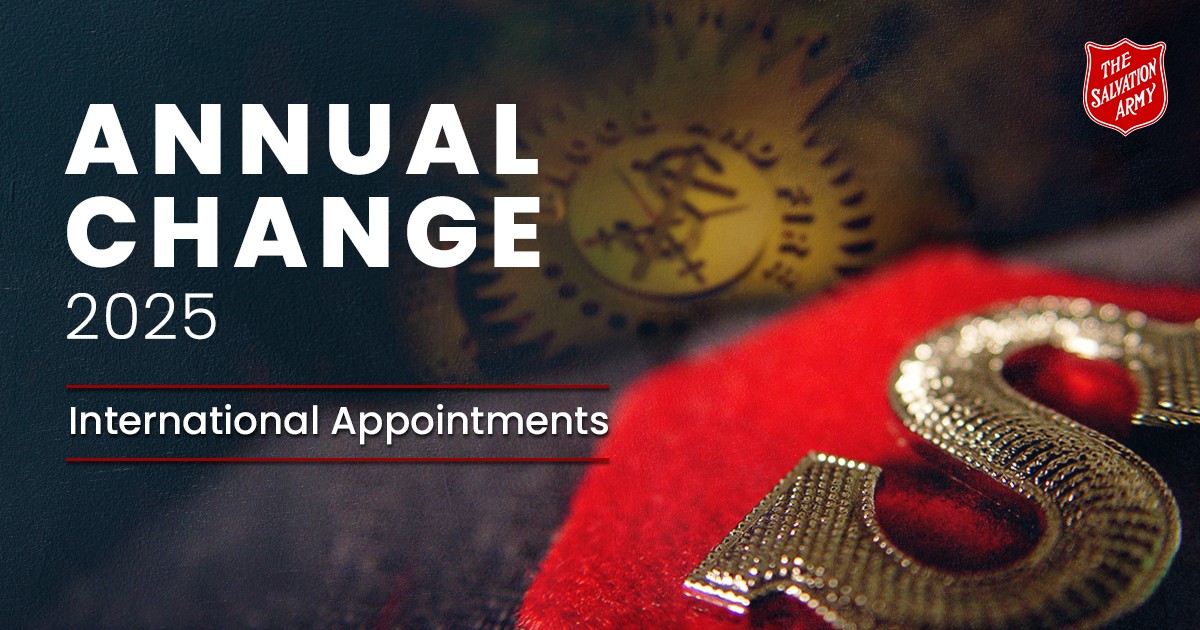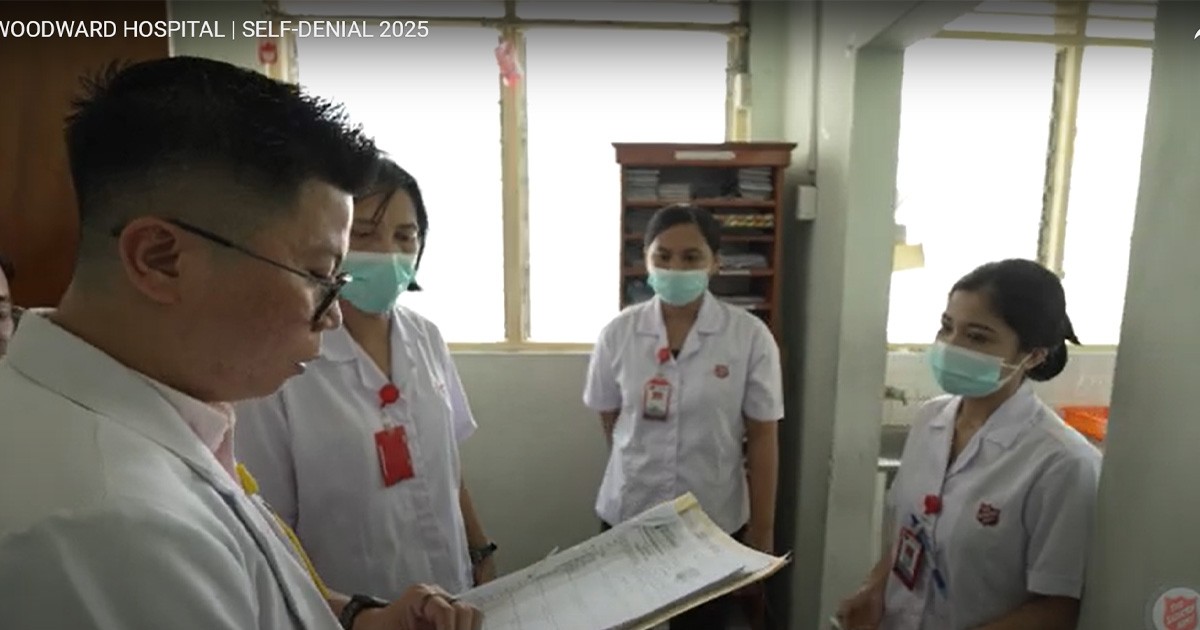 For the past two years, Colonel Susan McMillan, a Canadian officer, has been the territorial commander of the South America East Territory. In addition to appointments in Canada, Colonel McMillan served four years in Mexico as a lieutenant, during which time she learned to speak Spanish. She also served as finance secretary in South America East and as chief secretary in South America West. She speaks with John McAlister, features editor, about the Army's work in South America East.
For the past two years, Colonel Susan McMillan, a Canadian officer, has been the territorial commander of the South America East Territory. In addition to appointments in Canada, Colonel McMillan served four years in Mexico as a lieutenant, during which time she learned to speak Spanish. She also served as finance secretary in South America East and as chief secretary in South America West. She speaks with John McAlister, features editor, about the Army's work in South America East.
Describe the South America East Territory.
The Salvation Army has been here since 1890—that's over 120 years of ministry. It's been a rough history in many ways, as the three countries—Argentina, Paraguay and Uruguay—have experienced challenges politically and economically.
We have three divisions: Buenos Aires, which is the largest; Central Argentina; and Uruguay. We also have four districts, which have fewer corps, but in the case of the south and central part of Argentina, the geography is so vast that these districts cover huge amounts of land.
We have 43 corps, 14 outposts and 25 social services institutions, including shelters, daycares, after-school programs and medical clinics. We have 131 active officers, 33 retired officers and five cadets now in their second year of training.
What do you see as the strengths of the territory?
We are developing a sense that we need to become more self-sufficient. We need to stop relying completely on outside funding and work harder to achieve local funding. We've been expanding our recycling program—we call it Red Shield—and have opened a number of new thrift stores that seem to be doing well. The public is responding with donations and that has helped tremendously.
We believe that God is just waiting to do something here. We recently held a territorial congress with General Linda Bond and we feel that this marked the beginning of something important in this territory (see sidebar). We're trusting God to make that happen in all of our corps and in the communities where we serve. We minister in some desperate communities with extreme poverty and that's a challenge for us, but it's where we need to be. We need to carry the message of transformation, so we're believing that God is going to bless our efforts and that things are going to happen.
What are some of the significant challenges facing the territory?
Economics are the challenge here. Argentina has a history of economic problems, with hyperinflation and recessions. At the moment the economy is fairly stable, but we are still experiencing considerable inflationary pressures. Trying to keep up with that in terms of financing the Army is not easy. Many of our people live in extreme poverty, so even if they give their tenth, it's not going to finance our corps. Without Partners in Mission, we would be in trouble as we depend on those funds to maintain the Army's presence in our three countries.
Another challenge is the size of our membership. We have about 1,700-1,800 soldiers in the three countries and 43 corps, so we need to grow the Army. There's a lot of geography we haven't covered yet and cities that we're not in, so we need to have an Army presence in these places. We just celebrated the centenary of the Army's work in Paraguay, but we basically only have three corps, two outposts and some institutions. These are all in the capital city, so we haven't expanded out of there in a hundred years.
We need to be reaching more people with the message of the gospel than we do now. We're asking ourselves, how do we grow? How do we staff this potential growth? And how do we finance it? One area that we're focusing on is to place more emphasis on the work of local officers.
How does the expression of the Army in South America differ from North America?
One of the differences would be the type of appointments that our officers have. In North America you're more likely to have an officer serving as a corps officer or in a social service centre. In our territory, officers tend to have several appointments, so they might lead a corps and an institution or a thrift store or all three. We have divisional commanders who also serve as corps officers or social service administrators. And at THQ, many of us have multiple appointments as well, so we are spread a little thin and that's a challenge.
The format of our church services is not all that different. Brass banding is very much in vogue here and our young people are anxious to learn to play brass instruments. We have a number of bands around the territory, including an excellent territorial band. We offer teaching in our territorial and divisional music institutes every year. Creative dance is very popular particularly among our young women, as well as drama. And we have worship bands with electronic keyboards, guitars and drums, just as in Canada. These are more common than brass bands in some of our corps because the cost of getting instruments can be quite high. We also wear the same Salvation Army uniform as in North America.
Korean is one of the languages spoken in your territory. Do you have a Korean corps or outpost?
We have a Korean outpost here in Buenos Aires where there's a large Korean community. A lot of the clothing merchants are Korean and the clothing stores are located all together in a certain area of Buenos Aires. We have officers from the Korea Territory serving here on international service. We're hoping that they'll enrol a few soldiers and commission some local officers so that we can make it a corps. In order to connect with the community, they're offering computer courses, music training, English classes, Spanish classes and even a course in Chinese characters. The outpost is busy all the time with these outreach programs. They brought a group of Korean Salvationists to the congress, which was very exciting.
What are some of the challenges facing children and youth?
Drugs and gangs. We have programs in different parts of the territory where we're trying to deal with that, particularly with young people living in shanty towns. Canada is supporting one of those programs—the Evangeline Green Space Project—where we use sports and crafts and other activities to offer kids healthy alternatives and also share with them the message of salvation.
What role has the Army played in combating human trafficking?
Particularly in Paraguay, young children and women are being trafficked through Argentina to different parts of the world. We're trying to help those living in vulnerable neighbourhoods understand the dangers of this issue so that when people come to them offering opportunities of a lifetime, such as to study in a different country, they understand that they're probably trying to traffick their children. For the past three years, we've held a women's camp in Paraguary, and one year we held it in every division and district, that addressed domestic violence and human trafficking, trying to give women the tools they need to protect themselves and their children.
How does the Partners in Mission campaign contribute to the mission of the South America East Territory?
The funds raised go to International Headquarters who, in turn, send us an annual maintenance grant that helps us maintain the presence of the Army. Without these funds we couldn't survive, so Partners in Mission is what keeps our territory operating. Your support is absolutely vital to a territory like ours.
How has serving outside of Canada enriched your faith?
I've learned that I have to depend on God a whole lot more than I would have thought. I've had to do things that I never thought of myself as being particularly adept at. I've had to rely on the Lord and let him manage the work through me. I suppose the first obstacle I faced was the language, and he completely saw me through that. It's been interesting and enriching for me to be able to see the Lord at work in some difficult places.
How can Salvationists in Canada and Bermuda better support you and the South America East Territory?
First and foremost, pray for us. Pray that we will experience the outpouring of God's Spirit. Pray that we would strengthen our people and provide our officers and local officers with the resources they need to keep going, even though they have a tremendous amount of work and perhaps face opposition in their ministry. Pray that in the midst of financial difficulties, God would meet all our needs and allow us to look beyond them to see where he wants us to go. Second, keep giving to Partners in Mission. The funds raised through your generosity enable the international work of The Salvation Army to continue in territories such as ours.
Top photo: Col Susan McMillan visits an Army ministry in Buenos Aires, Argentina, located in a walled area referred to by most residents as the “Hidden City,” where 5,000 houses are crammed into a maze of narrow streets.










Leave a Comment